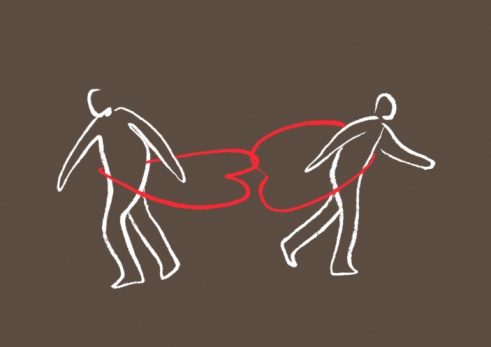 As a collaborative law professional, I work with divorcing couples on out-of-court resolutions that meet big picture goals and interests. It is challenging work that I have dedicated my career to and I strive daily to provide the highest level of service.
As a general practice, I check in with my clients a year or so after the divorce to see how things are going. I genuinely care about my clients and enjoy learning where they are at after a divorce and what accomplishments and challenges they have faced after the transition. While many traditional, court-based divorce attorneys hear from their clients often with post-decree disputes or modifications, I believe if I have done my job most effectively, clients will be prepared to handle most everything that comes up after a divorce on their own. More often than not, the only way I know how my clients are navigating a post-divorce world, is to reach out and ask them.
I recently heard from two former clients.
First, I heard from a spouse who had one of the more challenging financial situations I have dealt with. There was significant debt and substantial expenses (as there often are) and they had shared some unique financial goals regarding their investments and retirements moving forward. They also agreed to share future income in a manner that was unique in the eyes of the law, yet suited their big picture goals. The parents agreed on many parenting issues, but both had personal experiences with bad divorces in their own childhoods, so they were apprehensive and untrusting of the other. They also intended to move out-of-state for the main wage-earner’s work once the children finished the school-year, although there was concern on follow through with this agreement.
I heard from this client that the move happened without a hitch and they have peacefully transitioned into two homes in a new community. The children are thriving with the help of good communication and some family counseling. I heard from my client that “things are better than I expected” and that my client truly believes they are both doing really well. Most importantly, my client was excited to share the accomplishments of the children, yet sharing truthfully some of the difficulties they have had with the transition. This client expressed gratitude for a collaborative divorce process that allowed them to acknowledge the positives in their relationship and preserve what works, while restructuring things for a better future.
My other client had recently navigated his Wife getting remarried. He provided spousal maintenance to his ex-Wife and the decree had contemplated the financial circumstances changing upon remarriage if either spouse requested such a review. My client informed me that despite the decree allowing for a review, he had decided not to do so because he wanted to continue to support his ex-Wife in a financially stable situation for the benefit of his children. Even though he could have likely lessened his obligation, he felt most comfortable with maintaining the status quo and continuing support. Like my other client, he thanked me for providing a process that allowed him the flexibility to decide what feels right but also preserved the respect and caring he shares for his ex-Wife. Indeed, that respect has benefited her greatly as well through the support.
In my years of experience and check-ins with clients, I am continuously impressed by the level of gratitude clients express for the collaborative process. It is a process that creates unique outcomes tailored to each family’s needs and, I believe, results in longer lasting agreements and stronger post-divorce relationships.
As a collaborative law professional, I work with divorcing couples on out-of-court resolutions that meet big picture goals and interests. It is challenging work that I have dedicated my career to and I strive daily to provide the highest level of service.
As a general practice, I check in with my clients a year or so after the divorce to see how things are going. I genuinely care about my clients and enjoy learning where they are at after a divorce and what accomplishments and challenges they have faced after the transition. While many traditional, court-based divorce attorneys hear from their clients often with post-decree disputes or modifications, I believe if I have done my job most effectively, clients will be prepared to handle most everything that comes up after a divorce on their own. More often than not, the only way I know how my clients are navigating a post-divorce world, is to reach out and ask them.
I recently heard from two former clients.
First, I heard from a spouse who had one of the more challenging financial situations I have dealt with. There was significant debt and substantial expenses (as there often are) and they had shared some unique financial goals regarding their investments and retirements moving forward. They also agreed to share future income in a manner that was unique in the eyes of the law, yet suited their big picture goals. The parents agreed on many parenting issues, but both had personal experiences with bad divorces in their own childhoods, so they were apprehensive and untrusting of the other. They also intended to move out-of-state for the main wage-earner’s work once the children finished the school-year, although there was concern on follow through with this agreement.
I heard from this client that the move happened without a hitch and they have peacefully transitioned into two homes in a new community. The children are thriving with the help of good communication and some family counseling. I heard from my client that “things are better than I expected” and that my client truly believes they are both doing really well. Most importantly, my client was excited to share the accomplishments of the children, yet sharing truthfully some of the difficulties they have had with the transition. This client expressed gratitude for a collaborative divorce process that allowed them to acknowledge the positives in their relationship and preserve what works, while restructuring things for a better future.
My other client had recently navigated his Wife getting remarried. He provided spousal maintenance to his ex-Wife and the decree had contemplated the financial circumstances changing upon remarriage if either spouse requested such a review. My client informed me that despite the decree allowing for a review, he had decided not to do so because he wanted to continue to support his ex-Wife in a financially stable situation for the benefit of his children. Even though he could have likely lessened his obligation, he felt most comfortable with maintaining the status quo and continuing support. Like my other client, he thanked me for providing a process that allowed him the flexibility to decide what feels right but also preserved the respect and caring he shares for his ex-Wife. Indeed, that respect has benefited her greatly as well through the support.
In my years of experience and check-ins with clients, I am continuously impressed by the level of gratitude clients express for the collaborative process. It is a process that creates unique outcomes tailored to each family’s needs and, I believe, results in longer lasting agreements and stronger post-divorce relationships.  As a collaborative law professional, I work with divorcing couples on out-of-court resolutions that meet big picture goals and interests. It is challenging work that I have dedicated my career to and I strive daily to provide the highest level of service.
As a general practice, I check in with my clients a year or so after the divorce to see how things are going. I genuinely care about my clients and enjoy learning where they are at after a divorce and what accomplishments and challenges they have faced after the transition. While many traditional, court-based divorce attorneys hear from their clients often with post-decree disputes or modifications, I believe if I have done my job most effectively, clients will be prepared to handle most everything that comes up after a divorce on their own. More often than not, the only way I know how my clients are navigating a post-divorce world, is to reach out and ask them.
I recently heard from two former clients.
First, I heard from a spouse who had one of the more challenging financial situations I have dealt with. There was significant debt and substantial expenses (as there often are) and they had shared some unique financial goals regarding their investments and retirements moving forward. They also agreed to share future income in a manner that was unique in the eyes of the law, yet suited their big picture goals. The parents agreed on many parenting issues, but both had personal experiences with bad divorces in their own childhoods, so they were apprehensive and untrusting of the other. They also intended to move out-of-state for the main wage-earner’s work once the children finished the school-year, although there was concern on follow through with this agreement.
I heard from this client that the move happened without a hitch and they have peacefully transitioned into two homes in a new community. The children are thriving with the help of good communication and some family counseling. I heard from my client that “things are better than I expected” and that my client truly believes they are both doing really well. Most importantly, my client was excited to share the accomplishments of the children, yet sharing truthfully some of the difficulties they have had with the transition. This client expressed gratitude for a collaborative divorce process that allowed them to acknowledge the positives in their relationship and preserve what works, while restructuring things for a better future.
My other client had recently navigated his Wife getting remarried. He provided spousal maintenance to his ex-Wife and the decree had contemplated the financial circumstances changing upon remarriage if either spouse requested such a review. My client informed me that despite the decree allowing for a review, he had decided not to do so because he wanted to continue to support his ex-Wife in a financially stable situation for the benefit of his children. Even though he could have likely lessened his obligation, he felt most comfortable with maintaining the status quo and continuing support. Like my other client, he thanked me for providing a process that allowed him the flexibility to decide what feels right but also preserved the respect and caring he shares for his ex-Wife. Indeed, that respect has benefited her greatly as well through the support.
In my years of experience and check-ins with clients, I am continuously impressed by the level of gratitude clients express for the collaborative process. It is a process that creates unique outcomes tailored to each family’s needs and, I believe, results in longer lasting agreements and stronger post-divorce relationships.
As a collaborative law professional, I work with divorcing couples on out-of-court resolutions that meet big picture goals and interests. It is challenging work that I have dedicated my career to and I strive daily to provide the highest level of service.
As a general practice, I check in with my clients a year or so after the divorce to see how things are going. I genuinely care about my clients and enjoy learning where they are at after a divorce and what accomplishments and challenges they have faced after the transition. While many traditional, court-based divorce attorneys hear from their clients often with post-decree disputes or modifications, I believe if I have done my job most effectively, clients will be prepared to handle most everything that comes up after a divorce on their own. More often than not, the only way I know how my clients are navigating a post-divorce world, is to reach out and ask them.
I recently heard from two former clients.
First, I heard from a spouse who had one of the more challenging financial situations I have dealt with. There was significant debt and substantial expenses (as there often are) and they had shared some unique financial goals regarding their investments and retirements moving forward. They also agreed to share future income in a manner that was unique in the eyes of the law, yet suited their big picture goals. The parents agreed on many parenting issues, but both had personal experiences with bad divorces in their own childhoods, so they were apprehensive and untrusting of the other. They also intended to move out-of-state for the main wage-earner’s work once the children finished the school-year, although there was concern on follow through with this agreement.
I heard from this client that the move happened without a hitch and they have peacefully transitioned into two homes in a new community. The children are thriving with the help of good communication and some family counseling. I heard from my client that “things are better than I expected” and that my client truly believes they are both doing really well. Most importantly, my client was excited to share the accomplishments of the children, yet sharing truthfully some of the difficulties they have had with the transition. This client expressed gratitude for a collaborative divorce process that allowed them to acknowledge the positives in their relationship and preserve what works, while restructuring things for a better future.
My other client had recently navigated his Wife getting remarried. He provided spousal maintenance to his ex-Wife and the decree had contemplated the financial circumstances changing upon remarriage if either spouse requested such a review. My client informed me that despite the decree allowing for a review, he had decided not to do so because he wanted to continue to support his ex-Wife in a financially stable situation for the benefit of his children. Even though he could have likely lessened his obligation, he felt most comfortable with maintaining the status quo and continuing support. Like my other client, he thanked me for providing a process that allowed him the flexibility to decide what feels right but also preserved the respect and caring he shares for his ex-Wife. Indeed, that respect has benefited her greatly as well through the support.
In my years of experience and check-ins with clients, I am continuously impressed by the level of gratitude clients express for the collaborative process. It is a process that creates unique outcomes tailored to each family’s needs and, I believe, results in longer lasting agreements and stronger post-divorce relationships. 



 While it is possible to file for divorce in Minnesota on your own, without legal representation, it can be difficult to manage, not only legally but also emotionally. Here are some reasons to have an attorney and NOT try and represent yourself:
While it is possible to file for divorce in Minnesota on your own, without legal representation, it can be difficult to manage, not only legally but also emotionally. Here are some reasons to have an attorney and NOT try and represent yourself:

 Collaborative Divorce was started in Minnesota 25 years ago and has spread to more than 20 countries because it meets two basic needs felt by divorcing couples around the world. What does it mean to say that a divorce is Collaborative?
First, it is important to understand that difference between the formal Collaborative divorce process (with a capital C) and the use of the word collaborative. To be collaborative simply means to work together and, in that sense, any divorce in which people work together could be described as collaborative, (small c). However, the Collaborative divorce process is something distinctly different.
Most people want to keep their divorce amicable, and Collaborative Divorce gives them the tools to work out of court to make that happen. At the same, people facing divorce want to know that they are protected; that they have someone looking out for their interests. Collaborative Divorce provides each party with an attorney who will work with them to help them achieve their most meaningful goals.
In a Collaborative Divorce, the attorneys must withdraw if the matter goes to court in an adversarial proceedings. That is the one rule. A rule that is simple and yet, changes the entire tenor of the divorce negotiation. It is a great example of addition by subtracting. By subtracting one element, (the ability of the lawyers to fight), a door is opened to add many more valuable tools (true interest based-bargaining, teaming with financial experts and mental health professionals, deeper solutions, etc.). That one change redefines the negotiation and creates a ripple effect that, if handled in a skillful manner, creates many more options.
People sometimes hire aggressive lawyers, reluctantly; believing that their spouse will be aggressive and that they, therefore, need to “fight fire with fire”. The problem, of course, is that fighting fire with fire means there is a great risk that someone (maybe everyone) will get burned.
Collaborative Divorce, with the agreement not to fight, is intended to put out the fire, so that you, and your spouse, can build their future on solid ground. That is not easy to achieve. It requires skill and commitment. An attorney who cannot use argument and fighting must have other skills. Equally important, clients who intend to achieve their highest goals without fighting must be prepared to work on developing other skills as well.
To learn more about the Collaborative Process and to find experts with skill and experience in this area, go to
Collaborative Divorce was started in Minnesota 25 years ago and has spread to more than 20 countries because it meets two basic needs felt by divorcing couples around the world. What does it mean to say that a divorce is Collaborative?
First, it is important to understand that difference between the formal Collaborative divorce process (with a capital C) and the use of the word collaborative. To be collaborative simply means to work together and, in that sense, any divorce in which people work together could be described as collaborative, (small c). However, the Collaborative divorce process is something distinctly different.
Most people want to keep their divorce amicable, and Collaborative Divorce gives them the tools to work out of court to make that happen. At the same, people facing divorce want to know that they are protected; that they have someone looking out for their interests. Collaborative Divorce provides each party with an attorney who will work with them to help them achieve their most meaningful goals.
In a Collaborative Divorce, the attorneys must withdraw if the matter goes to court in an adversarial proceedings. That is the one rule. A rule that is simple and yet, changes the entire tenor of the divorce negotiation. It is a great example of addition by subtracting. By subtracting one element, (the ability of the lawyers to fight), a door is opened to add many more valuable tools (true interest based-bargaining, teaming with financial experts and mental health professionals, deeper solutions, etc.). That one change redefines the negotiation and creates a ripple effect that, if handled in a skillful manner, creates many more options.
People sometimes hire aggressive lawyers, reluctantly; believing that their spouse will be aggressive and that they, therefore, need to “fight fire with fire”. The problem, of course, is that fighting fire with fire means there is a great risk that someone (maybe everyone) will get burned.
Collaborative Divorce, with the agreement not to fight, is intended to put out the fire, so that you, and your spouse, can build their future on solid ground. That is not easy to achieve. It requires skill and commitment. An attorney who cannot use argument and fighting must have other skills. Equally important, clients who intend to achieve their highest goals without fighting must be prepared to work on developing other skills as well.
To learn more about the Collaborative Process and to find experts with skill and experience in this area, go to 


